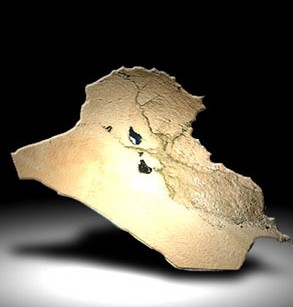The leader of al-Qaeda’s Iraq arm defiantly rejected an order from the terror network’s central command to stop claiming control over the organization’s Syria affiliate, according to a message purportedly from him that was posted online Saturday.
The statement by Abu Bakr al-Baghdadi, who heads the Islamic State of Iraq, illustrates a growing rift within al-Qaeda’s global network. It also highlights the Iraqi wing’s determination to link its own fight against the Shiite-led government in Baghdad with the cause of rebels trying to topple the Iran-backed Syrian regime.
The statement surfaced as rockets rained down on a Baghdad camp housing Iranian exiles, killing three people in the latest sign of growing unrest inside Iraq.
In an audio message posted online, the speaker identified as Baghdadi insists that a merger he announced in April with Syria’s al-Nusra Front, also known as Jabhat al-Nusra, to create a cross-border movement known as the Islamic State in Iraq and the Levant will go on.
Al-Nusra is an al-Qaeda affiliate that has emerged as one of the most effective rebel factions in Syria. Its head, Abu Mohammad al-Golani, has rejected the takeover attempt by Baghdadi.
“The Islamic State in Iraq and the Levant will continue,” Baghdadi said.
“We will not compromise and we will not give up.”
Al-Qaeda’s global leader, Ayman al-Zawahiri, has tried to end the squabbling and bring the group’s local affiliates back in line.
In a letter posted online by Qatar-based al-Jazeera TV last Sunday, Zawahiri declared that the Islamic State in Iraq and the Levant will be abolished and that the Iraqi and Syrian groups would remain independent, with Baghdadi and Golani as leaders of their respective branches.
Baghdadi is defying that command. In his statement, he referred to “the letter attributed to Sheik al-Zawahiri,” suggesting he was calling into question its authenticity.
“I chose the command of God over the command that runs against it in the letter,” Baghdadi said.
He urged his followers to rise up against Shiites, Alawites and the “Party of Satan” — a reference to the Iran-backed Lebanese militia Hezbollah, which has been sending fighters to Syria to fight alongside President Bashar al-Assad’s regime.
Assad comes from the Alawite sect, an offshoot of Shiite Islam.
It was not possible to independently confirm whether the speaker was Baghdadi, but the man’s voice was similar to that of earlier recordings.Charles Lister, an analyst at IHS Jane’s Terrorism and Insurgency Center, said there are indications that al-Nusra and the Islamic State in Iraq and the Levant are operating as distinct groups inside Syria.
He described Baghdadi’s defiance as “a potentially very damaging split within al-Qaeda’s senior leadership.”
“Al-Baghdadi’s statement underlines an extent of division between himself and Zawahiri but also with another al-Qaeda affiliate,” Lister said.
“Fundamentally, al-Baghdadi appears to be acting according to his own interests, instead of those of his ultimate ‘employer,’ al-Qaeda.”
Violence has spiked in Iraq in recent months, with the death toll rising to levels not seen since 2008.
Al-Qaeda in Iraq is thought responsible for many of the car bombings and other attacks targeting the country’s majority Shiites and symbols of the Shiite-led government’s authority.
Iraq risks growing more deeply involved in the Syrian civil war raging across its western border.
Iraqi border posts along the Syrian frontier have come under attack by rebels, and Syrian truck drivers and soldiers have been killed inside Iraq.
Iraqi fighters are moving across the border, with Sunni extremists cooperating with the rebels and Shiite militants fighting alongside government forces.
Also on Saturday, an Iranian exile group living in a camp near Baghdad airport reported multiple casualties when the compound, known as Camp Liberty, came under attack from rockets.
The group, the Mujahideen-e Khalq, is the militant wing of a Paris-based Iranian opposition group that opposes Iran’s clerical regime and has carried out assassinations and bombings in Iran. It fought alongside Saddam Hussein’s forces in the 1980-88 Iran-Iraq war, and several thousand of its members were given sanctuary in Iraq.
It renounced violence in 2001.
Camp residents Kolthom Serahati and Javad Naghashan were killed and several others were wounded, according to the National Council of Resistance of Iran.
Several Katyusha rockets struck the area, according to Iraqi security officials.
Police and hospital officials said an Iraqi was also killed and that the wounded included at least nine Iranians and seven Iraqis. The officials spoke on condition of anonymity because they were not authorized to release the information.
Iraq’s government wants the Mujahideen-e Khalq out of the country, and the United Nations is working to relocate residents abroad. Several residents moved to Albania last month.
There was no immediate claim of responsibility for Saturday’s attack.
by the Associated Press













0 Comments